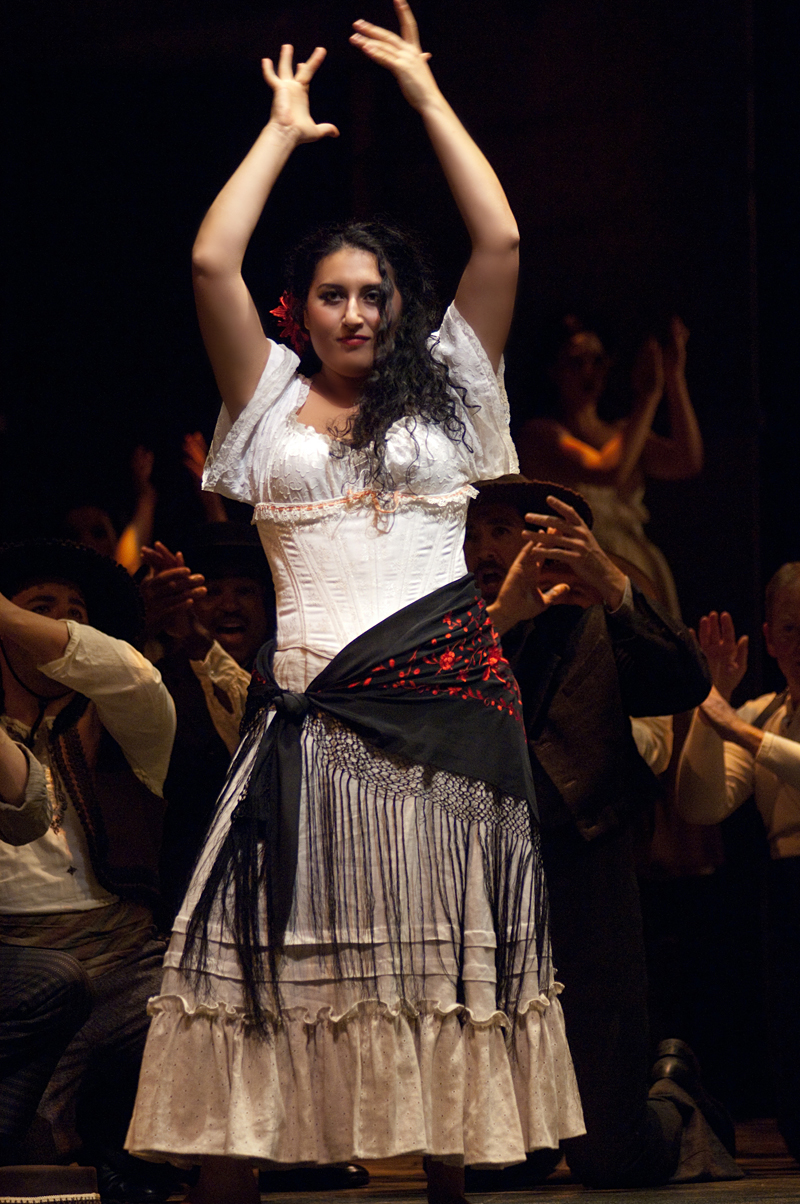Seattle Opera’s current production of Bizet’s best-known opera, which opened Oct. 15, is more traditional than the company’s past stagings have been—largely naturalistic but for a few mild stylizations. Director Bernard Uzan’s best idea comes in the final scene, as Carmen is confronted, then stabbed, by lover A, Don José, while the orchestra plays reminiscences of lover B, toreador Escamillo. Enhancing Bizet’s ironic coup de théâtre, Uzan staged the scene, and Luis Chapa acts it, as if the triumphant bullfight music is possibly José’s in-head hallucination. Uzan’s worst idea: having José’s commanding officer, Zuniga, executed during Act 2’s rousing “Freedom!” chorus, in a staging both vulgar and lackluster.
Singing José the night I attended (three roles in SO’s production are double-cast), Chapa brings the role a somewhat glutinous tenor and a heavily glottal approach to diction, scooping the notes and words out of the back of his throat. (In radio-DJ parlance, this is known as “puking.”) This tic hurts his big Act 2 love aria (he sounds best in his sonorous high notes, when he simply opens his mouth and lets them out), but not the final scene, where he’s fantastic: a little bit mad, a lot pathetic, powerfully transformed from the self-assured José of the opera’s beginning.
Opposite him, Anita Rachvelishvili is a smart and sly Carmen, if never a truly fiery one; she has a very dark-timbred voice, a very pronounced vibrato, and a not-infallible ability to sing on pitch. I don’t mean it as snark when I say she’s at her most captivating in her spoken dialogue (in French opéra-comique style, rather than grand opéra style, not all the text is sung)—it’s an uncommon quality for an opera singer to be able to compel attention equally whether singing or not. Seattle Opera audiences are not reflexive standing-ovationers, but they’re quick with “Bravo!”s when warranted, and it was telling that neither José’s aria nor Carmen’s signature “Habanera” got more than polite applause.
As Micaëla, the hometown girl who loves José, soprano Norah Amsellem also has a dark and mature voice, fairly similar to Rachvelishvili’s—it’s a small point, but a dose of Carmen’s drama comes from the contrast of the two women between whom José is torn, and vocally this is diminished. Most satisfying overall is Michael Todd Simpson, slim and sinuous as Escamillo. There seems to be at least a bit of the dandy in all Latin men, and Simpson’s summer-weight baritone is ideal for this side of the character, a natural lady-killer without having to try too hard.
Under Pier Giorgio Morandi, the orchestra sounds lively and snappy, if never punchy or explosive. I later heard complaints about slow tempos, but none of his choices struck me as unusual. R. Keith Brumley’s sets and especially Donald Edmund Thomas’ lighting achieve ravishingly painterly effects; the staging of the Act 1 cigarette girls’ chorus appears like a Bouguereau full of languid nymphs.







